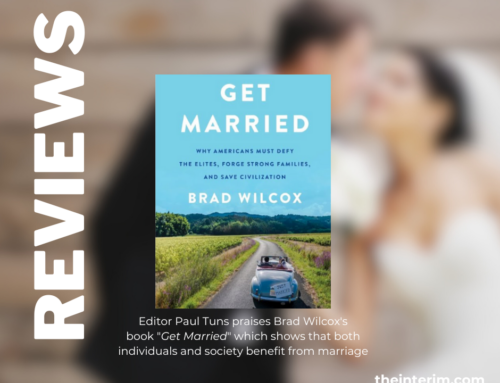Is being pro-life just choosing a side? Or does having a profound respect for all human life from conception to natural death define the way you live your life? On June 9, Jill Stanek had a blog post featuring the following question: “Should pro-lifers date/marry abortion proponents? The ideological divisions are quite deep, but are they surmountable for compatible coupling?”
When asked if she would ever date someone who was not pro-life, Campaign Life Coalition Youth coordinator Alissa Golob replied: “Yes I would and have, it’s not something you know right off the bat.” Golob told The Interim that she once went out on a few dates with a master’s student from Ryerson she met at a pub after nurturing the relationship on Facebook. The first date ended with a debate on abortion followed by text messages on the topic. He did research on the topic, especially the fact that contrary to his misperception that there was a law limiting abortion, and eventually he “realized I was right.”
This begs the question: could dating abortion proponents be considered a form of missionary work, with pro-lifers using the opportunity to change another’s heart and mind? Golob says no, “because you’re transcending the intellectual with the emotional, it could interfere with a proper or sincere conversion” of the abortion supporter to a pro-life position. CLC summer intern, Theresa Jalsevac agrees with Golob, as she questions the motives behind someone changing their views on abortion: “are they changing because of you, or because they truly believe you are right.”
Johnathon Van Maren, communications director for the Canadian Center for Bioethical Reform, vehemently objects to pro-lifers dating abortion proponents. In an email interview with The Interim, Van Maren wrote that we should “keep in mind that abortion is the greatest social evil of our day, and constitutes the willful targeting and destruction of a pre-born child’s body. This is not something we can ‘agree to disagree’ on.”
Jill Stanek, the blogger who initiated this debate, explored the problems of such relationships in an email to The Interim. She said that “if one is pro-abortion, one is a moral relativist, so the issue of abortion will not be the only ideological difference a pro-lifer will encounter if dating a pro-abort. It will only be the start.”
When Golob shared her dating experience with an abortion supporter, she said that their second date ended with a debate about same-sex “marriage”. A debate about abortion could unlock the door to a store of different opinions on all life issues, and in Golob’s experience, the debate about same-sex “marriage” made the second date the last one – they were just too different.
Alissa Golob’s experience is a perfect example of dating in order to get to know someone. Often you are not immediately aware of where someone stands on abortion. Golob jokingly stated, “that should be the next question after, ‘what’s your name’.” In her case, the issue of abortion would quickly arise considering her 9-5 job is working to end abortion. Van Maren whose full-time job is also pro-life activism agrees with Golob. He said, “we should work to change the minds of those around us on this issue, and if we are interested in dating one them, that is a discussion I think should happen first.”
Both Golob and Jalsevac said that dating a pro-abortion activist would be difficult if not impossible compared to someone who claims a thoughtless ‘pro-choice’ stand. Golob shared that it is the job of the pro-lifer to enlighten the ignorant, but when it comes to dating an activist she wouldn’t recommend it. “You can always continue discourse with them and help them reach the full knowledge of the truth,” just not in a dating relationship. Van Maren gives an outright no to dating people who hold opposite views on the issue.
Both Stanek and Jalsevac raised the point of the role of (serious) dating being that it leads to marriage, and how would you feel if you’re spouse was okay with murdering your children? Stanek wrote in her email that, “a person who would accept murdering his/her own baby, or the baby of his/her mate, is not someone one should want to marry and have children with.” When asked if she ever had or would date someone who was pro-abortion, Jalsevac told The Interim that “I haven’t dated anyone who is pro-abortion and I probably wouldn’t because it’s like they are pro-murder.”
So considering all these fundamental problems, are they, as Stanek puts it, “surmountable for compatible coupling?” What advice can be offered to those already in such relationships? Jalsevac would suggest reaching an agreement before “tying the knot, because it could cause serious issues in a marriage.” Golob thinks it’s dependant on the circumstances, “but ultimately do you want to marry someone who has such fundamental differences that would seriously affect your marriage?”
Both Golob and Jalsevac share the benefits that come when dating someone else who is pro-life. Jalsevac expresses that there are already many existing difficulties in a relationship, and by dating someone who is pro-life you don’t have to worry about changing them as well. There is the added benefit, she notes, “you can both do pro-life activism together.” Golob agrees that it is easier to be on the same page because there is a deeper bond that comes from shared values.
More importantly, Golob said, “there’s a profound respect for the woman; for each other, because you’re not objectifying the other for sex.”
Van Maren reiterates that the compatibility of a couple on “an issue of such moral enormity” is essential and should be a pre-condition of dating, not a result of it.




